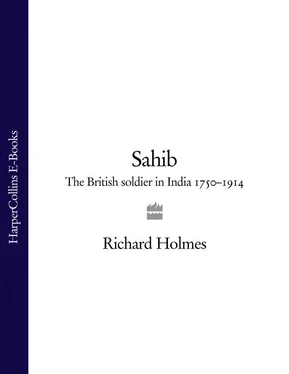In that short time we had gone down about four miles – and farther on there was a fall in the river about fifteen feet high. Five minutes more and we would have been over it.
The engine was saved, but Browne had to walk five miles home, wet, shoeless and clad only in his night-shirt. 12
Temperatures can range between the tropical and the polar. Lieutenant John Corneille arrived in India with HM’s 39th in 1754, and emphasised the extraordinary variation in the climate in Bengal:
May, in my opinion, is as hot as human nature can well support. June, July and August, which form the rainy season and are subject to great thunder and lightning, are very warm, yet frequently each day is refreshed by very cooling showers. September and October are fine but still very hot. Though November, December, January and February are in the morning liable to thick fogs and very cold, in the middle of the day they are as delightfully temperate as even a European constitution desires. After that the heat gradually increases. 13
Isabella Fane, daughter of General Sir Henry Fane, Commander in Chief, India, found Calcutta decidedly unpleasant in April 1836:
The very sound of a blanket now in Calcutta makes one start, so frightfully are we all grilling. The thermometer in the room is 84, in the shade 96 and God knows what in the sun, but my father thinks it is quite pleasant weather! So much for occupation! I must say for women, and occupied men, this climate does very well, but for those like the aides-de-camp of the establishment who have little or nothing to do, it must be anything but agreeable. The whole house is shut up tight from nine in the morning until six in the evening, and in the course of twenty-four hours three is all that it is possible to spend out of doors.
A month later she reported that: ‘Even my father finds it hot and goes without his waistcoat or stock and with his gills turned down en garçon.’ 14At the other military extreme at much the same time, for Private Robert Waterfield of HM’s 32nd, June in Meerut cantonment was a trying experience:
Thermometer 88°–90°. Weather continued intensely hot, men crowding the hospital, numbers die of apoplexy. The intemperate by no means suffer as one would imagine … Two parades a day in consequence of the men drinking so much. This is hard on a temperate man, to be punished for other’s faults. The consequence of these parades is that the men drink more, the constant work inducing thirst. These things do not tend to make a commanding officer very popular. 15
Captain the Hon. W. G. Osborne wrote that it reached 113 degrees at 10.00 in the morning in his camp in the Punjab:
All sorts of experiments to keep themselves cool are tried by the different unhappy individuals in camp; I think mine the most successful. Dig a large hole in the ground, in the centre of your tent, then place your table over it to form a sort of inner roof, and prevent the sun from shining down upon you. Make your bheestie water the whole floor of the tent, and then hang a wet sheet over the hole … pegged on the ground at the edges of the pit to prevent it touching the bottom; take off all your clothes, and get into it, and by having a skin of water thrown over you every ten minutes, you may perhaps get the temperature down to 100°, which would be a perfect heaven to what we are now enduring. 16
It was far harder for soldiers in the field. War correspondent W. H. Russell was caught between the hammer of the sun and the anvil of the plain at Lucknow in March 1858:
The heat was sweltering and I pitied our men as they stood under its rays, many of them unprovided with proper protection against the sun and retaining their old European outfit. I felt the exhaustion produced by the temperature so much, that I could scarcely move a hundred yards without visible distress. The perspiration rolled in streams down our faces between banks of hardened dust, which caked as it settled on our saturated clothes. And these poor fellows might be exposed for hours, not only to this terrible heat, but to a hard struggle and severe fighting. ‘Water! Water! Pane! Pane!’ was the cry on every side. 17
Lieutenant Wilberforce, marching from Amritsar to Delhi the previous year, wrote that: ‘We are out in a field, and the heat is no joke: 105° at 9 o’clock, 120° at 12, and from 2 to 4 about 130°; we get under our beds with a wet towel round our heads.’ 18Lieutenant Richard Barter later recalled that making for Delhi with the 75th Highlanders was every bit as unpleasant:
By 9 a.m. the hot wind was blowing through the mango tope [the grove of trees where they had spent the night] scorching up everything. None in this country can form an idea of what this really is; the nearest approach to it is the hot room of a Turkish bath, but the hot wind differs from this by bringing out no moisture, but withering up the skin like parchment until it crackles, and the mouth and throat become parched and the lips split from the fierce furnace-like blast. We threw water over one another from the bhisti’s water-bags and saturated our turbans and clothes, but in ten minutes after we were as dry as tinder, and towards noon all but the sentries dropped off into a queer state which could not be called sleep, till the fierce sun went down and the wind had ceased, when the Assembly sounded and we were once more on the long dusty road. 19
The arrival of the monsoon was a shock. In 1879, Second Lieutenant Charles Callwell, a gunner officer in Dinapur cantonment, described:
The break of the rains in Bengal, an atmospheric upheaval pined for by those who, half blinded by the incessant glare, have been sweltering in the plains for the two or three months preceding, is a very wonderful spectacle. For a week or two before the crash, huge cloud-masses have been banking themselves up ever higher and higher in the sky, the constant flickering of sheet lightning during the night-watches has almost turned darkness into day, and a brooding stillness has steeped the face of the land in an unnatural ominous repose. Then, almost without warning and with startling suddenness, there comes a mighty rush of wind, every door that happens to be shut opens and every door that happens to be open shuts, the temperature drops fifteen or twenty degrees in as many minutes, the roar of the thunder drowns that of the tempest, and down comes the rain – rain such as is rarely seen in England even during the most violent of magnetic storms and which lasts not for minutes but for hours. You hurry on some warmer garment in support of the negligée which had previously sufficed, and then having made all secure against hurricane and deluge, you issue onto the veranda to watch the downpour … But if the actual break of the rains brought a delightful freshness with it at the moment, one soon found that the change of seasons had its drawbacks. For one thing, it put an end to polo for the time being. The Ganges … began rising, and it went on rising till its muddy waters partly flooded the station … Then when the floods subsided, there came fever and sickness, even if the heat was far less trying than it had been. 20
Mrs Muter, married to Captain Dunbar Douglas Muter, whose health had broken down during the Mutiny, accompanied him to the Murree Hills in the autumn of 1858, and saw how:
A column of mist fell over the hill like a pall, penetrating into every house. There it hung like death, stealing around all the contents and spreading over them a green and unhealthy mould. Shoes left for a night looked in the morning as if taken from a vault with the rot of a year on them. Scarcely a breath stirred in the leaves – nothing moved except the rain that at intervals fell in torrents. The air was without electricity, without wind and loaded with moisture -we were living in a stagnant cloud. 21
Читать дальше












